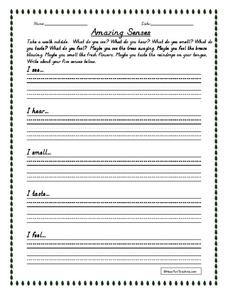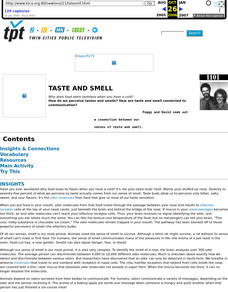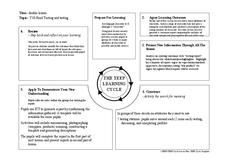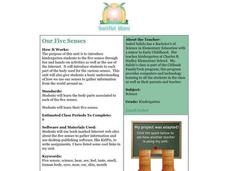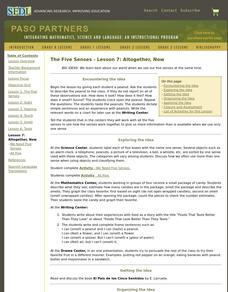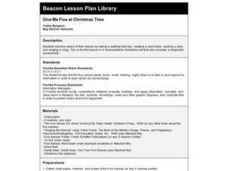Curated OER
Taste (Gustation)
Students conduct various experiments to see if different parts of the tongue are more sensitive to different characteristics of food.
Curated OER
I Belong to.....(The Senses)
In this neuroscience for kids activity, learners identify whether each of the 20 body parts listed belongs to the eye, ear, nose, or mouth.
Curated OER
Amazing Senses
For this five senses worksheet, students investigate their sense of sight, hearing, smell, taste and touch by taking a walk and writing their observations.
Curated OER
Taste and Smell
Students experiment to determine classmates taste and smell to find out which sends the clearest message to the brain.
Curated OER
The Senses
In this senses learning exercise, students use a text book to complete 34 fill in the blank statements about the structures and functions associated with the 5 senses.
Curated OER
Your Five Senses
In this categorizing worksheet, students use the words in the word box to think about what they would see, feel, hear, touch, and taste. Students then categorize the words into the appropriate section. Students then list their favorite...
Curated OER
Food Testing and Tasting
Students list the attributes of chocolate as an unprocessed and processed substance. They conduct a taste test of various chocolate bars and give a
rating for each attribute they previously listed. Students create a consumer review...
Curated OER
Making Sense of Things: The Human Body and Senses
Students conduct an experiment to evaluate the accuracy of their senses.
Curated OER
Five Senses-Introduction
Pupils explore the parts of the body that are used to develop the five senses. They conduct a nature walk. Students identify the things they see, hear, smell, and touch. They create a graphic organizer to organize their answers.
Curated OER
Sensing Somethong
Young scholars are taught that they can gather information about objects using the five senses of vision, touch, smell, taste, and hearing. They are told that some sensing, like sight, is done remotely. Students observe how a camera can...
Curated OER
Anatomy Grade Level: First Grade - FIVE SENSES
First graders name the five senses, identify major body structures and organs and describe their basic functions. In this anatomy lesson, 1st graders learn about the basic structures and functions of the human body and how they relate to...
Curated OER
Observing and Discovering Using Our Senses
Third graders decide if it is possible to identify something using only the senses of taste, smell and hearing. They listen to a CD of animal sounds with their eyes closed and attempt to identify the animal. Next, they smell an air...
Curated OER
Our Five Senses
Students explore the five senses through hands-on and Internet activities.
Howard Hughes Medical Institute
Recent Adaptations in Humans
You've probably spent plenty of time discussing animal adaptations with your young biologists, but what about human adaptations? Explore the evolving traits of humankind through an interactive that combines text and video clips. Scholars...
Curated OER
Altogether, Now
Learners apply their five senses to science, math, drama, and writing center activities.
Curated OER
Sense of Taste and the Tongue
Young scholars taste different foods and record their reaction to each one. They record their likes, dislikes, and favorites and create a graph. Then they use the graph to compare the tastes of the class.
Poetry4kids
How to Write an Apology Poem
Put a silly spin on making amends with an apology poem. Budding poets think of a time they were made to apologize although they didn't mean it. They then turn their experience into a poem that offers details and ends with an explanation...
Curated OER
What Food Is It?
Students close their eyes and taste foods without using the sense of sight to identify the foods. They record what they think the food is that they tasted.
Curated OER
Can You Guess The Flavor?
Second graders conduct a tasting experiment. In this senses lesson, 2nd graders read The Five Senses and brainstorm different tastes. They work in pairs, one blindfolded and the other recording. The blindfolded student eats one skittle...
Curated OER
Observation
Students study the different kinds of observation: fact and opinion. In this observation instructional activity students complete an activity that allows them to use their senses to make observations.
Curated OER
The Nervous System and the Effects of Drugs
In this senses worksheet, students use webbed information to answer several questions. Students read about each one of the five human senses in order to demonstrate an understanding of the material.
Curated OER
Creating an Interesting Setting
In this setting worksheet, students fill out a chart for seeing, feeling, smelling, tasting, and hearing in a setting. Students complete 20 boxes total in the chart.
Curated OER
Cooking Lesson
Fourth graders taste different flavors on their popcorn. In this taste bud lesson, 4th graders make predictions about taste and dip popcorn into four different flavors. They record how the flavors tasted - sweet, salty, bitter, or sour.
Curated OER
Give Me Five at Christmas Time
Students study about senses by taking a walking field trip, creating a word bank, reading a story and singing a song.




